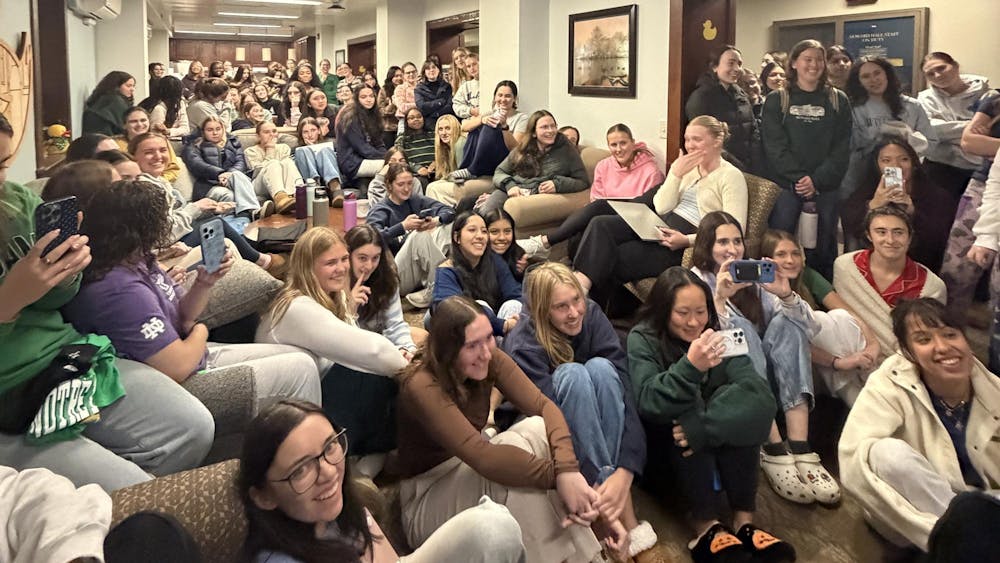For its 2019-2020 season, Notre Dame’s Film, Television and Theatre department (FTT) will draw inspiration from the Cuban-American playwright and Obie award winner María Irene Fornés to present plays and musicals around the theme of “developing new voices.”
The season will begin with staged readings of four of Fornés’s plays from Oct. 2 through Oct. 13. The production of Notre Dame professor Anne García-Romero’s play, “Staging the Daffy Dame,” will follow, with showings from Nov. 20 to Nov. 24. Two new one-act plays written and directed by Notre Dame students for ND Theatre NOW will premiere next semester, from Feb. 20 to March 1. The season will conclude with a production of “Jesus Christ Superstar,” from April 1 to 5.
Kevin Dreyer, associate professor and director of theatre, said the idea of “developing new voices” is related to FTT’s goal to present more diverse casts and represent more voices in their shows, giving space to individuals who might not otherwise feel included on campus. The FTT department has a unique connection to Fornés: she was a mentor to García-Romero, who then taught the two students who wrote the plays for ND Theatre NOW, Dreyer said.
The season serves to commemorate the life and work of Fornés, who died in 2018. Notre Dame is not alone in celebrating her over 2019-2020 season, though. In her memory, the Fornés Institute — of which García-Romero is a founding member — started Celebrating Fornés, which encourages universities and theatre companies to dedicate a school year or season to productions of Fornés and her works. Notre Dame is one of 22 participating organizations.
“It kind of happened by synchronicity and kismet that the trajectory of the season is [based on] my mentor, Fornés,” García-Romero said. “We’re doing her plays, then we’re doing a play of mine, then we’re doing my students’. … It wasn’t an intentional objective initially to do this sequence, but I’m really happy the way it [has] turned out.”
She studied under Fornés at the Yale School of Drama and at the Padua Hills Playwrights’ Festival for two summers. Fornés’ own teaching was influenced by her background as a painter, such that her writing is very focused on creating character first, followed by language and then structure, García-Romero said.
García-Romero said Fornés had a huge influence on not only her teaching but also her writing.
“Her methodology is very innovative and has influenced the way I teach playwrighting, the way I write plays,” García-Romero said. “ … She had a unique gift to help writers find their voice and encourage their voice to take shape in whatever way it needed to take shape, with the goal to be as authentic as possible.”
Dreyer said García-Romero employs similar means of teaching students at Notre Dame.
“We’re looking really at the lineage and heritage of developing a dramatic voice or a theatrical voice,“ Dreyer said. “Many of the same techniques that Fornés used when she approached her own writing are what Anne teaches her students. We’ve got three generations of dramatic voice that have all been kind of focused on the same sort of approach to writing.”
Dreyer said when it came time to choose which of Fornés play to perform, though, the department ran into difficulties.
“What I realized in looking over her material and talking with Anne further about it is that one of the things about [Fornés] is that, stylistically, her plays change a lot,” Dreyer said. “To pick one piece was not representative of her as an artist … but if we’re going to be celebrating her legacy, it seems wrong to pin it on one play.”
While the department couldn’t afford to produce four full plays with sets and costumes, they instead decided to do staged readings of four of her plays to put the emphasis on the text itself.
The FTT department not only produces several productions each year, but also teaches and instructs students, so many of the productions are centered around curricular connections, García-Romero said. Four different directors are directing the staged readings, she added. Two of them are Notre Dame professors and two are visiting directors from Chicago, giving students an opportunity to work one-on-one with professionals.
Similarly, students applied last semester to direct or have the play they wrote produced for ND Theatre NOW. The four chosen will take a class this semester to prepare them for producing a new show next semester.
Read More
Trending









